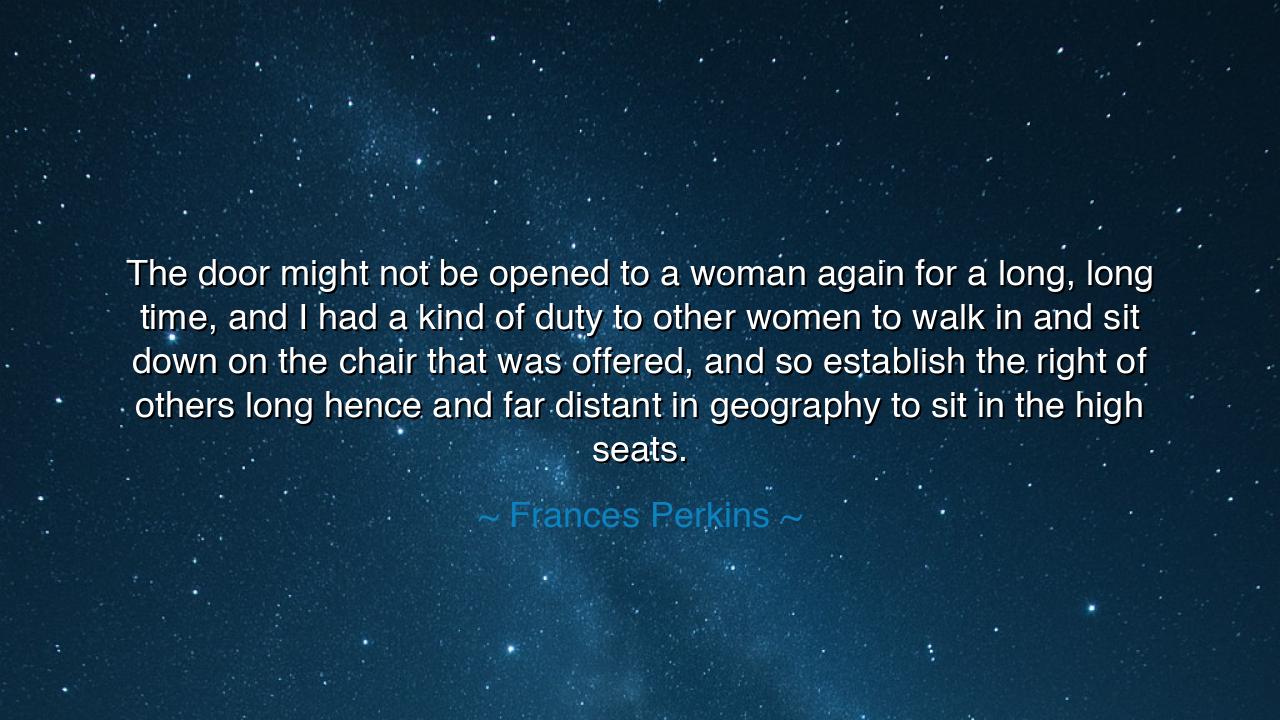
The door might not be opened to a woman again for a long, long
The door might not be opened to a woman again for a long, long time, and I had a kind of duty to other women to walk in and sit down on the chair that was offered, and so establish the right of others long hence and far distant in geography to sit in the high seats.






The words of Frances Perkins — “The door might not be opened to a woman again for a long, long time…” — resound like the voice of destiny calling across centuries. She spoke not only of her own burden, but of the eternal struggle of those who carry the hopes of the many upon their shoulders. For when the door to power, rare and heavy with resistance, creaks open even a little, it is not merely an invitation to one soul, but a sacred passage meant for all who will follow.
In her time, Frances Perkins became the first woman to serve in a United States presidential cabinet. She knew well that her place was not granted to her alone, but to all women, past and future. The chair she sat upon was not just a seat of office, but a symbol — a high seat that had long been denied. She understood that to refuse the call would be to let the door close again, perhaps for ages. To accept it, however heavy the duty, was to hammer into stone the right for others to enter. Thus she bore her task as both leader and guardian, ensuring that the path would not vanish into shadow.
History is rich with such examples. Recall Joan of Arc, who in her youth took command of armies not for herself but for the deliverance of her people. Though her life was short, her courage shattered the walls that confined women to silence. Centuries later, her fire still blazes as proof that when one dares to pass through a forbidden door, others may follow. Frances Perkins stood in this same tradition, wielding not sword nor banner, but wisdom, resolve, and faith in the generations yet unborn.
The ancients taught that to act only for oneself is to build a house of straw, but to act for others is to lay foundations of stone. Perkins knew this truth. By seizing her chance and planting herself firmly in the “high seats,” she proclaimed that women were no longer guests in the councils of power, but rightful heirs. Her courage was not measured by ease or triumph, but by her willingness to endure loneliness, scrutiny, and resistance for the sake of countless unseen sisters.
Therefore, O children of tomorrow, learn from her example: when a door is opened to you, do not shrink back. Enter, even if the hall beyond is cold and hostile. Sit upon the chair, even if it feels too heavy for your frame. For in doing so, you do not sit for yourself alone, but for those who will come after — long hence, in distant lands, seeking their place in the high seats. This is the duty of pioneers: to claim not just honor, but freedom for all.






NNhung
I really admire Perkins' willingness to take on the responsibility for future generations of women, but it also brings up an important question: In today's world, where women are entering more leadership roles, do we still face the same urgency to ‘establish the right’ for others to follow? Or has progress made this less of a priority? How can we ensure that we continue pushing boundaries for those who are yet to come, even as the landscape changes?
TVTrang Vu
Frances Perkins' words remind us of the historical struggles that women have faced in securing positions of power. I appreciate her sense of duty, but it makes me wonder if the desire to open doors for others sometimes conflicts with one’s own personal ambitions or fears. How does one balance the responsibility to uplift others while pursuing personal goals, especially when society still places limitations on women’s success and visibility?
BPTran Bao Phu
This quote from Frances Perkins speaks to the weight of representation. There’s an immense responsibility in taking a seat at the table when it’s not just for personal gain but to establish a future for others. But in a world that still struggles with gender inequality, can we truly say that every woman feels empowered to take that step? What are the barriers that still exist today that prevent women from feeling like they have the right to sit in those high seats?
XLTHCS xa Xuan Lai
I love how Perkins highlights the idea of breaking down barriers for others, but it makes me wonder: How often do women feel the weight of that duty, especially when they’re faced with the chance to occupy spaces that historically excluded them? Is it empowering to take that seat, or does it come with an emotional cost, carrying the expectations of representing all women? How can women support each other in such moments of pressure?
KLkhanh linh
Frances Perkins’ perspective on women’s duty to pave the way for future generations really resonates with me. It’s a reminder that opportunities, once given, can be fleeting, and there’s an inherent responsibility to seize them not just for oneself, but for others who may not have the same chance. But I wonder, is this responsibility always clear, or do some women feel pressured to represent all women in such roles? Does this ever feel burdensome rather than empowering?